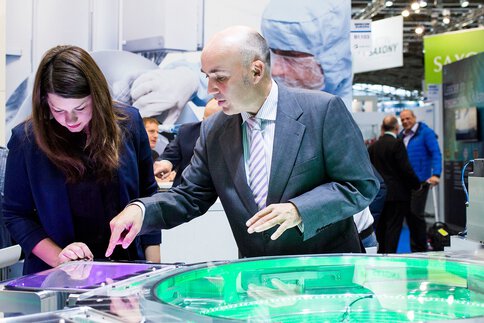Digital transformation: Towards the laboratory of the future
The laboratory world is changing. Against the background of increasing digitization, various processes and structures must be rethought for the laboratory of the future. Indispensable for the beginning of the new era are networked laboratory devices with intelligent and smart functions, complex holistic automation concepts and efficient interface solutions. In the age of personalization, the continuous availability of vast amounts of data places new demands on data handling and secure data storage.
Digitization has arrived in the laboratory, and with it, a paradigm shift is emerging.
Driven by increasing complexity of laboratory processes and the surge in legal regulations, efficient and safe work in the laboratory is becoming ever more important. Automated laboratory steps and optimized work processes make significant contributions to meeting these goals. It is necessary to create a flexible laboratory environment that is individually tailored to the users’ current needs. At the same time, the aim is to increase the quality of the analysis results, combined with the possibility of recording, organizing and automatically evaluating larger amounts of data.
Bridge between the life sciences and automation technology
In the intelligent laboratory of the future, analyzers and measuring devices, sensors, processes and data are networked with each other. Automation and laboratory information management systems regulate and control this network. Such integration requires appropriate interfaces in hardware, electronics and software.
The devices must be able to communicate with one another via suitable network accesses and drivers for integrated laboratory automation systems. With the requirement of permanent availability, for example with regard to remote control and remote maintenance, automation and needs-based networking solutions become indispensable.
Laboratory automation as an innovation driver
The basis for successful automation and LIMS networking is a functioning IT structure. Only in this way can the diverse processes be sustainably controlled and monitored. In addition, reliability in evaluation, storage and management can be guaranteed, which will be of central importance today and in the future: In tomorrow’s lab, the data volumes will be gigantic. The resulting torrent of data is a major challenge not only for laboratory data handling but also for the entire laboratory management. Laboratories will become veritable data mills, and with regard to regulations and standards, the issue of “Big Data” is becoming increasingly important.
Today, in the SiLA Initiative (Standardization in Lab Automation) renowned institutions such as the Fraunhofer IPA are developing communication interfaces, software solutions and standards for tomorrow in order to easily integrate device components and laboratory utensils or laboratory supplies and consumables from various manufacturers.
Optimally developed automation levels and integrated device modules for dynamic application capabilities allow efficient and reproducible—i.e. validatable—process design with integrated data management. It is imperative to transform manual into automated processes, and to integrate existing laboratory information management systems in order to make the laboratory think tank even more efficient.
Intelligent laboratory systems and individual networking, as well as sustainable integration of the laboratory into the corporate structure, increase not only the flexibility but significantly also the economic viability of a company.
Especially in the growth-oriented industrial laboratory, the priority is to improve efficiency, optimize structures, and increase flexibility. Decisive prerequisites and success factors for achieving these objectives are state-of-the-art, high-resolution, communication-capable analysis systems and functional automation solutions to ensure reaction parameters and product quality, as well as rapid data availability and efficient data management.

Experience the future of the laboratory live
Laboratory 4.0 revolutionizes the lab world from sample logistics to data management and enables novel approaches to personalized processes. Big Data, Cloud Computing, the Internet of Things, and the mobile Internet as next-generation technologies will all play key roles in ensuring future growth. The analytica presents solutions for the laboratory world of tomorrow already today. Opportunities and risks of digital transformation in the laboratory are presented by experts.

Using trend reports for editorial purposes is free of charge if the source is acknowledged as "analytica / Messe München". We would be pleased to send you high-resolution photographic materials upon request. Voucher copy requested.
